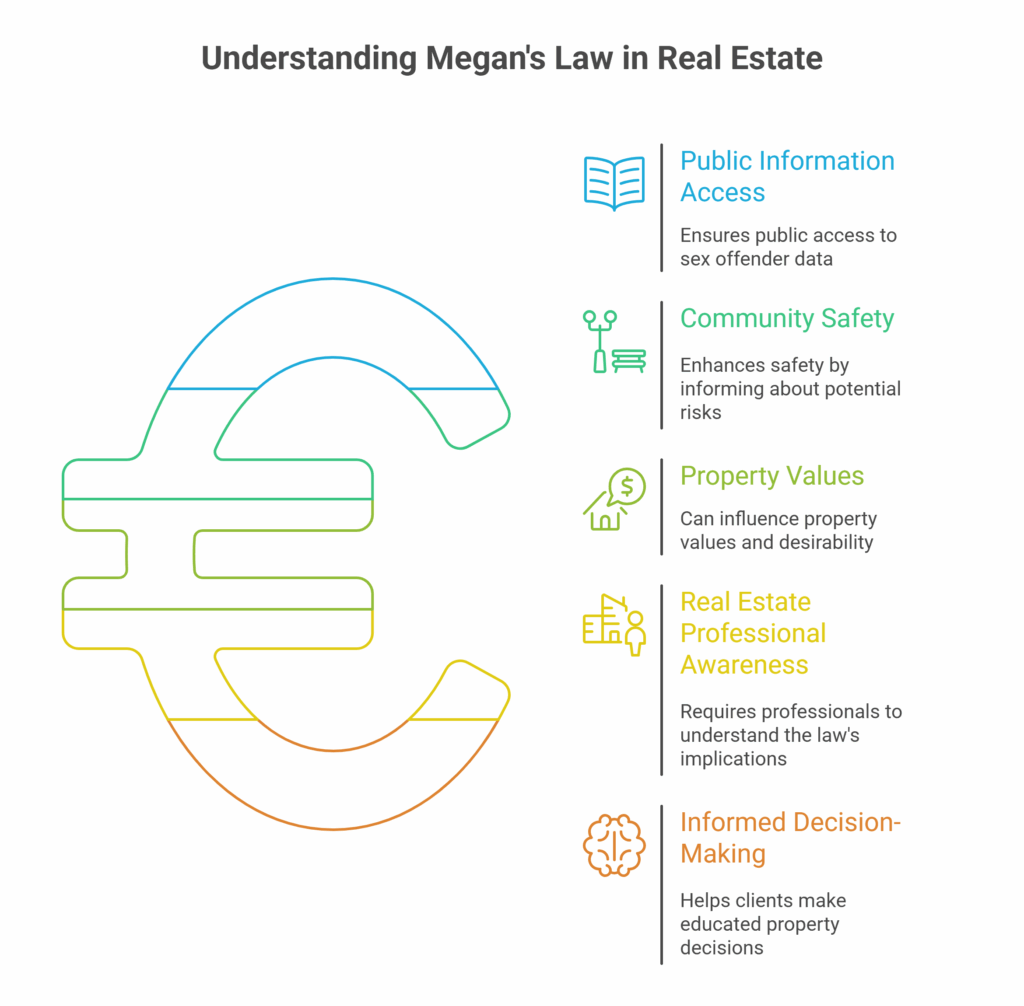Quick Answer: What Is Megan’s Law in Real Estate?
What Is Megan’s Law in Real Estate? It’s a legal requirement that ensures buyers and renters are informed about registered sex offenders living nearby. In real estate, this law gives potential homeowners the right to access public databases and learn if such individuals reside in the neighborhood before making a decision. The responsibility often falls on the buyer to research, while agents disclose where the information can be found.
Knowing What Is Megan’s Law in Real Estate? helps families feel safer, protects agents legally, and ensures transparency in property transactions.
Now let’s dive deeper.

The Origin of Megan’s Law
Megan’s Law was enacted in 1996 after the tragic case of Megan Kanka, a young girl from New Jersey who was assaulted and killed by a neighbor with a prior history of sexual offenses. The case sparked nationwide demand for public access to information about registered sex offenders.
This led to federal legislation requiring each state to maintain a registry and provide the public with offender location information. While the core law is federal, individual states have their own guidelines on how information is shared and how it impacts real estate transactions.
How Megan’s Law Affects Real Estate Transactions?
For Home Buyers and Renters
Megan’s Law empowers potential buyers and renters to check whether a property is located near a registered sex offender. Many states provide online search tools through law enforcement or state databases.
For Home Sellers and Landlords
Disclosure rules vary:
- In some states, sellers and landlords are required to disclose known information about registered offenders nearby.
- In other states, sellers are only required to inform buyers or tenants about where they can obtain this information.
- Some states place the responsibility entirely on the buyer or tenant to investigate.
Why It Matters in Real Estate?
Megan’s Law can impact the perceived desirability and market value of a property. Buyers who discover a registered offender nearby may reconsider a purchase or negotiate for a lower price.
For sellers, being aware of their state’s disclosure laws is essential to avoid legal issues later. Failing to follow these rules could result in lawsuits or the cancellation of a sale.
Practical Steps for Buyers
If you’re buying a property and want to be thorough in your due diligence:
- Use official resources: Check your state’s online sex offender registry.
- Ask your agent about local rules: Some areas may require sellers to provide written notice about Megan’s Law.
- Research the neighborhood: Beyond Megan’s Law concerns, look into crime rates, schools, and community amenities.
Practical Steps for Sellers and Landlords
To stay compliant and protect yourself legally:
- Know your state’s disclosure laws: Your real estate agent or attorney can confirm what’s required.
- Include the right language in contracts: Many states have standardized forms with Megan’s Law clauses.
- Be transparent when required: If your state mandates disclosure, provide accurate information or direct buyers to official registries.
Common Misunderstandings About Megan’s Law in Real Estate
- It does not prohibit living near a sex offender: The law focuses on information access, not residential restrictions.
- It doesn’t always require direct disclosure: In many states, providing the buyer with information about how to access the registry is enough.
- It applies nationwide, but rules differ locally: Federal law mandates public access, but states decide how to implement it.
Final Thoughts
Megan’s Law plays a significant role in real estate by ensuring transparency and giving buyers and renters the information they need to make informed decisions. Whether you’re selling, buying, or renting, understanding your state’s specific rules helps you stay compliant and avoid future legal or financial complications.
The bottom line: it’s not just about the property—it’s about the community around it. Access to this information is part of the due diligence process every real estate transaction should include.
If you’re in a situation where you need to sell quickly, sell my house fast Humble TX is exactly what we help with. Our team buys homes in any condition, offering fair cash offers and flexible closing dates to fit your timeline.
Call us anytime at 713-561-5162 or connect with us on our website and we’ll lay out all of your options for your specific situation.
